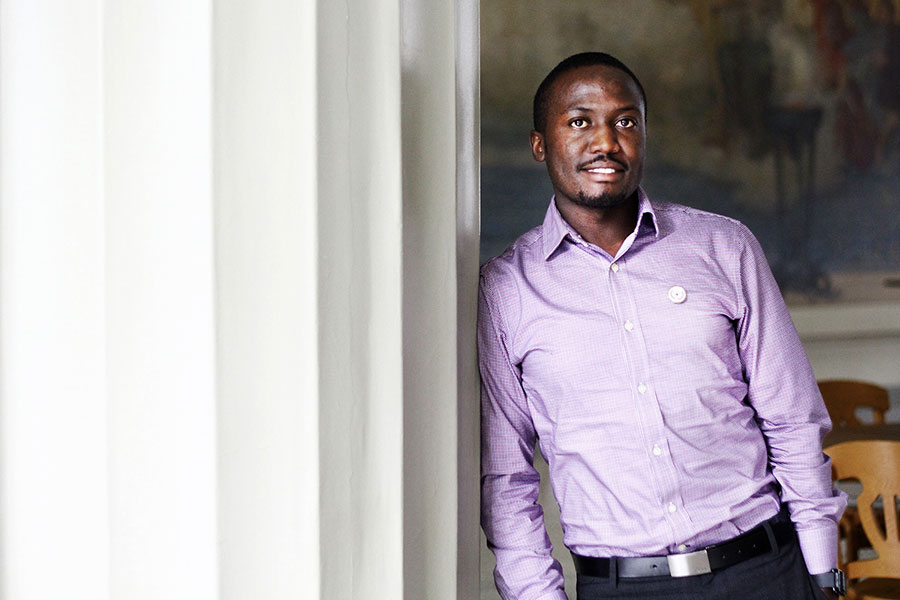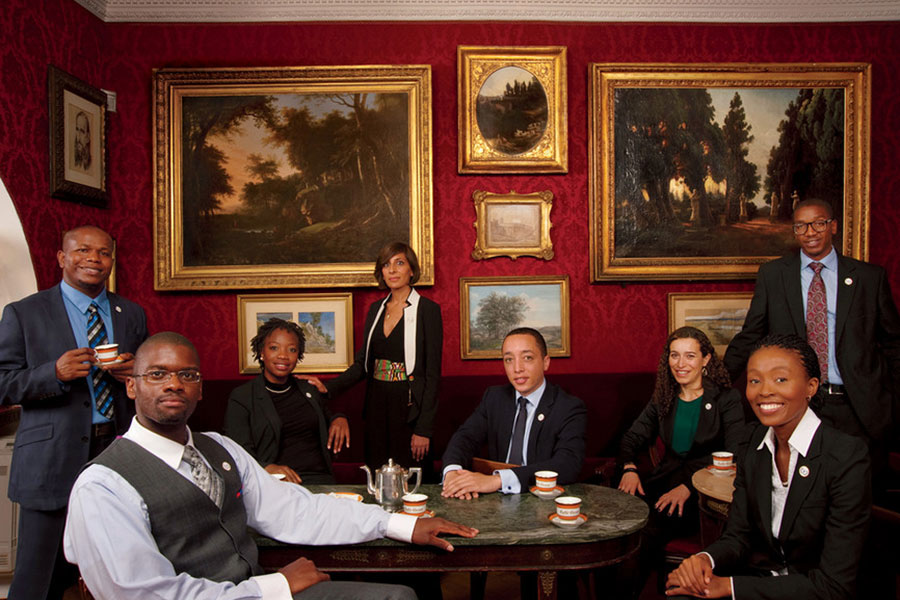An historic declaration becomes the inspiration for Africa’s rejuvenation.
- Okendo Lewis-Gayle is inspired by a meeting with Barack Obama who tells him to “hitch your wagon to something larger than yourself in life.”
- Young African talent is being enticed out of major multi-national corporations and being put to work in new African startups.
- Western countries historically lack a connection between business and the social purpose of business.
Every year at the Mount Washington Hotel, on the very same table that the Bretton Woods Agreement was signed in 1944, an unlikely group gathers to sign a declaration. The signing is presided over by a tall, imposing man dressed in a three-piece suit and instead of aging men from Europe, he’s surrounded by young African entrepreneurs in their twenties. The man is Okendo Lewis-Gayle, the founder of the Harambe Entrepreneur Alliance, a network that provides highly educated young African entrepreneurs opportunities in the academic and corporate world, and most importantly, up to $200,000 in venture capital. Lewis-Gayle has named the declaration the Harambe Bretton Woods Declaration and is a pledge to “work together as one to pursue the social, political and economic development of Africa.”
It’s an astonishing feat by the 31-year-old, who now chooses from over 2,000 young Africans who apply to become part of his entrepreneurial ecosystem every year. The organization has persuaded large firms such as McKinsey & Company, GlaxoSmithKline, and Standard Chartered Bank to provide grants, pro bono services, and expertise to its members and their start-ups. The result: a 31-country assembly of 225 bright young entrepreneurs. The startups include H.I.V initiatives in Uganda, fashion labels in Kenya, poultry-farms in Zimbabwe and app-development firms in Senegal. “We’re not a think tank – we’re a do tank,” says Idris Bello, one of the Harambean’s from Nigeria.
Lewis-Gayle’s realization that he wanted to create positive change in the world began in 2007 when he was elected the first black president of the student body of a predominantly white New Hampshire campus. Another presidential candidate at the time, none other than Barack Obama, was invited to deliver the graduation speech and share a stage with Lewis-Gayle. After being told by his friends that he should, “Just shut up and sit down’” in the face of a clearly superior speech-maker, Lewis-Gayle stood up and said to Obama, “Well I too was told that a person with a funny name like Okendo and a color like my own could not be President. But here I am, so don’t let that stop you running for President.”
Obama went on to tell the students that to only focus on pursuing the mighty dollar would result in a poverty of ambition. But the words that really hit home for Lewis-Gayle was when Obama told him, “Hitch your wagon to something larger than yourself in life.”
Between his home in Rome, his travels in Africa and his numerous engagements with The White House, The African Union and at leading global corporations, Lewis-Gayle found time to explain to Real Leaders why he’s earned the title of Africa’s Chief Strategist.
What inspired you to establish the Harambe Entrepreneur Alliance exclusively for the benefit of Africa?
I wanted to lower the barrier to entry for African entrepreneurs and also place angel investors and venture capital with young talent that needed to get things done. We’ve traditionally lost African talent to large multinational firms in London and New York. I wanted to get them back to Africa to start new companies on the ground. The challenge was whether we could incentivize them and help them understand how they could use their talent to create value on an entire continent.
You’re obsessed with strategy. Why?
Strategy is where the real battle is – not about being strong or swift. Anyone with a sober assessment of Africa’s challenges knows that trend is not destiny. To seize the opportunities that present themselves requires strategic thinking, not denial. To say Africa is rising, yet ignore inadequate education and unemployed is not good strategy. Does that mean we’re doomed? No, it means that we have to think ahead of the game.

How do you combine the inspirational, emotive part of your work with strategy Are they mutually exclusive?
They must be combined. The reason many things in Africa carry so much emotion is because there’s a lot of energy on the continent. It’s the youngest region in the world, and you naturally have a lot of people who are energized and want to get out there and do things. In the perfect entrepreneurial eco system you’re lucky if three out of ten people who receive funding succeed. You need to be realistic and get entrepreneurs and investors to see they’re in for the marathon, not a quick sprint.
A lot of people talk about Africa being the next big thing, would you agree with that?
The next big economic powerhouse? No, we’re not going to be another China. We’ll be part of the narrative that’s seeing other developing countries such as Brazil and India come to the fore. Africa is beginning to be more agile, more responsive, more innovative. It’s already here, and it’s a step.

Africa has historically relied heavily on charity and philanthropy. How do you go about changing this perception?
If you looked at India a few years ago, everybody thought it was a basket case for charity and yet today, success in business has changed perceptions. Africa won’t completely shed its image but an alternative story will develop that will make it harder to pin one continent of a billion people, in 54 countries, living on one million square miles to a comment that says, “the whole thing is just one color.” We’ve had a single narrative until now and our challenge is to create a more multi-dimensional Africa.
Many new catchwords exist in business today: social impact, sustainability, and conscious capitalism – many hardly known five years ago. Do these ideas apply to Africa as well?
Five years ago I spent a day with the Dalai Lama and representatives of JP Morgan, The Blackstone Group and other large corporations to discuss a book called Business Beyond Religion: Ethics for a Whole World. It became clear that in Western countries there is a very unfortunate dichotomy between business and the social purpose of business. It seems as if there was a divorce at some point and people just said these ideas have nothing to do with each other.
Business in Africa is very much about meeting the needs of communities and families in a very direct way and many of these catchwords have actually been in practice for decades.




































